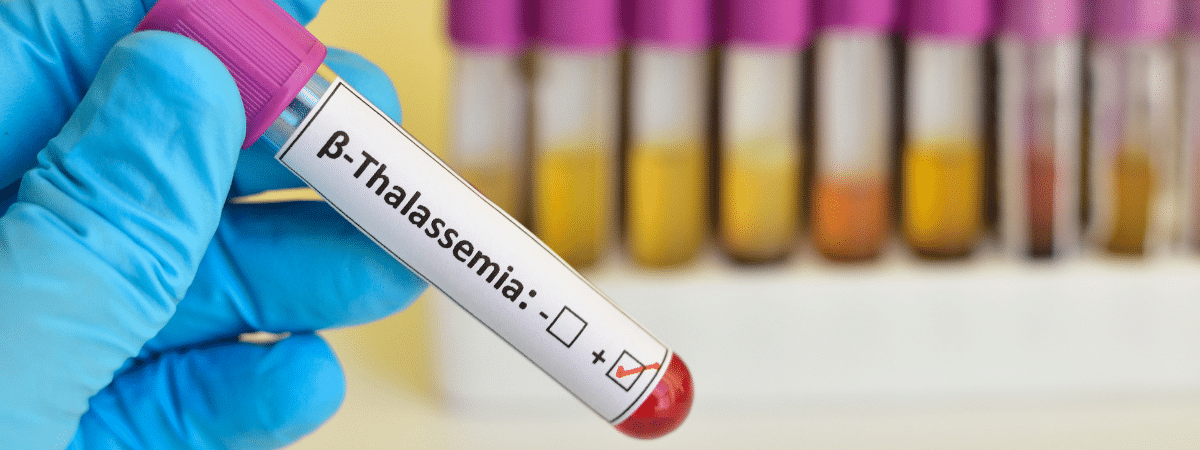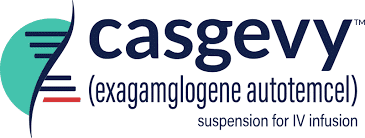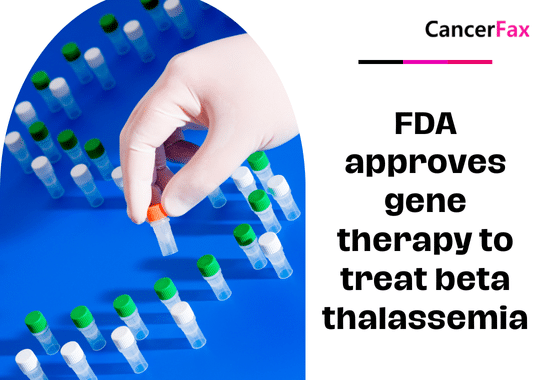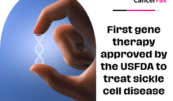FDA approves gene therapy to treat beta thalassemia
FDA approval of gene therapy
The FDA has made it possible for people 12 years of age and older who have transfusion-dependent beta-thalassemia (TDT) to use exagamglogene autotemcel (Casgevy, Vertex). This is a cell therapy that changes genes using CRISPR/Cas9. The FDA granted prior approval for gene therapy on December 8th, 2023, to treat individuals suffering from sickle cell disease (SCD).
Exagamglogene autotemcel is a form of cell therapy that involves editing a patient’s own hematopoietic stem and progenitor cells using the CRISPR/Cas9 gene-editing technique. This editing occurs at the erythroid-specific enhancer region of the BCL11A gene, and it is done by creating a precise double-strand break.
When this change happens, more fetal hemoglobin is made in red blood cells. This has been shown to reduce or eliminate vaso-occlusive crises in people with sickle cell disease and cut down on the need for transfusions in people with transfusion-dependent thalassemia.
Last month, the European Medicines Agency recommended the approval of exagamglogene autotemcel for the treatment of SCD or TDT patients aged 12 and above, who are suitable for hematopoietic stem cell transplantation but do not have a compatible donor. This recommendation applies to countries outside of the United States. Last week, Vertex also disclosed that it obtained regulatory authorization for exagamglogene autotemcel in Saudi Arabia.
What is beta-thalassemia?
Beta thalassemia is an inherited blood disorder in which the production of hemoglobin, a protein in red blood cells responsible for carrying oxygen throughout the body, is lowered. This occurs because of mutations in the HBB gene that codes for the beta-globin subunit of hemoglobin. This genetic defect leads to ineffective erythropoiesis and hemolysis, leading to anemia.

There are three basic forms of beta thalassemia: minor, intermedia, and major. Beta thalassemia minor is when a person has one defective gene. In this case, anemia is mild and does not cause any serious health problems. Patients with beta thalassemia intermedia have moderate anemia and a host of other health problems, but many individuals can lead normal lives without the need for regular blood transfusions.
The most severe degree of this condition is represented by beta thalassemia major, also called Cooley’s anemia. This happens in those homozygous for a mutation of the gene coding for beta-globin chains, leading to a very serious anemia that will require regular blood transfusions and chelation therapy to rid the body of excess iron.
The major symptoms of β-thalassemia are very severe anemia, growth retardation, skeletal deformities, and increased susceptibility to infections. Diagnosis is based essentially on blood tests, genetic testing, and sometimes examination of the bone marrow. Treatment is mainly symptomatic and complication management, and in some cases, bone marrow or stem cell transplantation may be curative.
CRISPR/Cas9 technology
The cell-based gene therapy known as Casgevy has received approval for treating sickle cell disease in people aged 12 and above who have recurring vaso-occlusive crises. The first drug using CRISPR/Cas9 genome editing technology is Casgevy, according to the FDA. Hematopoietic stem cells of patients are genetically edited utilizing CRISPR/Cas9 technology.
The CRISPR/Cas9 system may be specifically guided to cleave DNA at desired locations, allowing for precise manipulation of DNA by removing, adding, or replacing genetic material at the site of cleavage. The altered blood stem cells are reintroduced into the patient’s body, where they attach and reproduce in the bone marrow.
This leads to an augmentation in the synthesis of fetal hemoglobin (HbF), a specific form of hemoglobin that aids in the transportation of oxygen. Elevated levels of HbF in individuals with sickle cell disease inhibit the process of red blood cell sickling.
Casgevy

A gene-editing treatment called Casgevy, which used to be called CTX001 or exa-cel, is approved for people with sickle cell disease (SCD) who have repeated vaso-occlusive crises (VOCs). Its purpose is to decrease the frequency and intensity of these agonizing episodes.
The treatment, delivered by a single intravenous infusion, was developed by CRISPR Therapeutics and Vertex Pharmaceuticals. Casgevy is approved to treat transfusion-dependent beta thalassemia (TDT) in addition to sickle cell disease (SCD).
Evidence in Favor of Casgevy
Casgevy’s safety and effectiveness were assessed in an ongoing trial including multiple centers, where adult and adolescent patients with SCD were included. Patients had a documented record of experiencing at least two protocol-defined severe vaso-occlusive crises (VOCs) in each of the two years before the screening. The main measure of effectiveness was the absence of severe VOC episodes for a minimum of 12 consecutive months within the 24-month follow-up period.
There were a total of 44 individuals that received treatment with Casgevy. Out of the 31 patients that were able to be evaluated for a sufficient amount of time, 29 of them (93.5%) obtained the desired outcome. All patients who received treatment had effective engraftment, with no instances of graft failure or graft rejection seen.
The predominant adverse effects seen included thrombocytopenia and leukopenia, oral ulcers, emesis, musculoskeletal discomfort, stomach discomfort, febrile neutropenia, cephalalgia, and pruritus.
Dr. Nishant Mittal is a highly accomplished researcher with over 13 years of experience in the fields of cardiovascular biology and cancer research. His career is marked by significant contributions to stem cell biology, developmental biology, and innovative research techniques.
Research Highlights
Dr. Mittal's research has focused on several key areas:
1) Cardiovascular Development and Regeneration: He studied coronary vessel development and regeneration using zebrafish models1.
2) Cancer Biology: At Dartmouth College, he developed zebrafish models for studying tumor heterogeneity and clonal evolution in pancreatic cancer.
3) Developmental Biology: His doctoral work at Keio University involved identifying and characterizing medaka fish mutants with cardiovascular defects.
4) Stem Cell Research: He investigated the effects of folic acid on mouse embryonic stem cells and worked on cryopreservation techniques for hematopoietic stem cells.
Publications and Presentations
Dr. Mittal has authored several peer-reviewed publications in reputable journals such as Scientific Reports, Cardiovascular Research, and Disease Models & Mechanisms1. He has also presented his research at numerous international conferences, including the Stanford-Weill Cornell Cardiovascular Research Symposium and the Weinstein Cardiovascular Development Conference.
In summary, Dr. Nishant Mittal is a dedicated and accomplished researcher with a strong track record in cardiovascular and cancer biology, demonstrating expertise in various model systems and a commitment to advancing scientific knowledge through innovative research approaches.
- Comments Closed
- July 13th, 2024






Beta-globin gene correction, Beta-thalassemia gene therapy, Curative therapy for thalassemia, FDA-approved genetic treatment, Gene therapy for blood disorders, Rare disease treatment 2022, Thalassemia cure breakthrough, Zynteglo approval
🌟 Welcome to Beijing Biotech! 🌟
Thank you for reaching out! We are dedicated to transforming lives through advanced gene therapy solutions for sickle cell disease and thalassemia. Our team is committed to delivering cutting-edge treatments, personalized care, and support on every step of your journey to better health.
Please feel free to ask any questions or let us know how we can assist you. Together, we’re here to make a difference.
Warm regards,
The Beijing Biotech Team